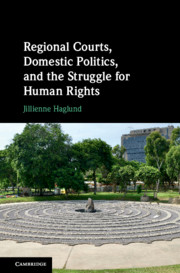Book contents
- Frontmatter
- Dedication
- Contents
- List of Figures
- List of Tables
- Acknowledgements
- 1 Introduction
- 2 Explaining Regional Human Rights Court Deterrence
- 3 Examining Patterns of General Regional Court Deterrence
- 4 Does the Executive have the Capacity to Respond to Adverse Judgments?
- 5 Is the Executive Willing to Respond to Adverse Judgments? The Role of Mass Public Pressure
- 6 Is the Executive Willing to Respond to Adverse Judgments? The Role of Elite Pressure
- 7 Amplified Regional Court Deterrence: High Executive Capacity and High Executive Willingness
- 8 Conclusion
- Appendix A Chapter 3 Appendix
- Appendix B Chapter 4 Appendix
- Appendix C Chapter 5 Appendix
- Appendix D Chapter 6 Appendix
- Appendix E Chapter 7 Appendix
- References
- Index
5 - Is the Executive Willing to Respond to Adverse Judgments? The Role of Mass Public Pressure
Published online by Cambridge University Press: 01 June 2020
- Frontmatter
- Dedication
- Contents
- List of Figures
- List of Tables
- Acknowledgements
- 1 Introduction
- 2 Explaining Regional Human Rights Court Deterrence
- 3 Examining Patterns of General Regional Court Deterrence
- 4 Does the Executive have the Capacity to Respond to Adverse Judgments?
- 5 Is the Executive Willing to Respond to Adverse Judgments? The Role of Mass Public Pressure
- 6 Is the Executive Willing to Respond to Adverse Judgments? The Role of Elite Pressure
- 7 Amplified Regional Court Deterrence: High Executive Capacity and High Executive Willingness
- 8 Conclusion
- Appendix A Chapter 3 Appendix
- Appendix B Chapter 4 Appendix
- Appendix C Chapter 5 Appendix
- Appendix D Chapter 6 Appendix
- Appendix E Chapter 7 Appendix
- References
- Index
Summary
This chapter empirically examines the role of executive willingness as a result of mass public pressure in regional human rights court deterrence. More specifically, I show that the executive is more likely to adopt, administer, monitor, and enforce human rights policy following an adverse judgment when executive job security is low. The presence of an adverse Inter-American Court judgment two years prior to an election year is associated with greater respect for rights than the presence of an adverse Inter-American Court judgment two years prior to a nonelection year. I also show that the presence of adverse European Court judgments two years before an election are associated with greater respect for rights when the executive expects to face a competitive election as opposed to a noncompetitive election. I also argue that the mass public may place pressure on the executive not to undertake human rights policy change following an adverse judgment and when states face threats to social and political stability, and I find that the executive is unlikely to forgo the use of repression following an adverse regional court judgment in the face of large social and political threats in society. I conclude by examining the conflicting types of pressure the mass public can place on the executive.
Keywords
- Type
- Chapter
- Information
- Publisher: Cambridge University PressPrint publication year: 2020



